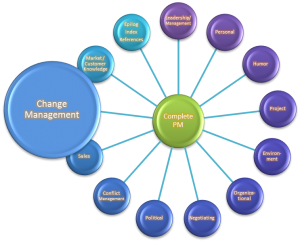 Project leaders do not like change any more than followers do unless, of course, it is their idea. Change is hard for everyone. You cannot move forward and stay the same at the same time. People resist change for several reasons:
Project leaders do not like change any more than followers do unless, of course, it is their idea. Change is hard for everyone. You cannot move forward and stay the same at the same time. People resist change for several reasons:
People resist change because of personal loss. A key obligation of a project manager is to talk to stakeholders about how that change will affect them.
People resist change because of fear of the unknown. Project managers need to communicate both knowns and unknowns throughout project life cycles.
People resist change because they were not part of the decision-making or implementation design process or because of bad timing.
Consider using this checklist:
- Will this change benefit the team?
- Is the change compatible with the purpose of the project?
- Is this change specific and clear?
- Are the top 20% (the influencers) in favor of this change?
- Is it possible to test this change before making a total commitment to it?
- Are physical, financial, and human resources available to make this change?
- Is the change reversible?
- Is this change the next obvious step?
- Does this change have both short and long-term range benefits?
If too many questions have a no by them, then the timing may not be right.
People resist change because it feels awkward. Accepting change as part of project lives means exposure to a variety of new and possibly uncomfortable situations. A complete project manager is willing to experiment, assess personal and others’ reactions and behaviors, and seek a path towards progress.
People resist change because of tradition. Many professionals have managed projects without applying a formal methodology for many years. Project results were not bad but not great either. As organizations grow in terms of people and project complexity, the need arises to implement a formal PM methodology.
The keys to dealing with change successfully are having a good attitude toward it and being prepared to meet it. Understand the change management process: create the conditions for change, make change happen, and make change “stick.” Change
will happen whether you like it or not. Without change there can be no improvement. Complete project managers make a commitment to pay the price for change. Change needs to happen within you before it can happen around you. It is never too late to change.
Randy Englund, Englund Project Management Consultancy, www.englundpmc.com
